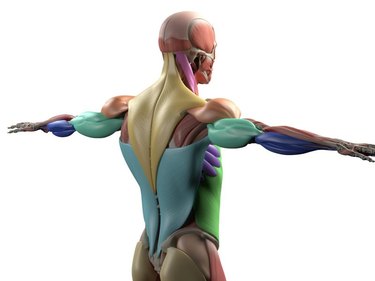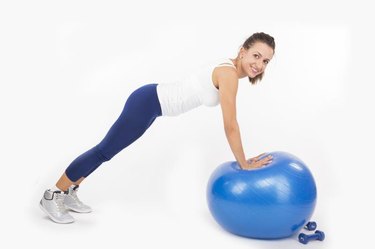
Chest pain can be caused by a lot of things ranging from muscle spasms or tightness to, well, heart attacks. If the problem is muscular, you may feel the pain when you move your arms, have trouble reaching upward, or experience numbness in your forearms or wrists. You may also notice that your shoulders are rounded forward.
If these indications sound painfully familiar, it is fairly safe to assume that the villain is the pectoralis minor. It's the small muscle that hides under the pectoralis major -- the big chest muscle. It attaches to the third, fourth and fifth ribs and its job is to move the shoulder blades up and down.
Video of the Day
Video of the Day
Read More: Pectoralis Minor Stretches
The Tight and the Weak
Pec minor is a small muscle, but when it gets tight, it gets mean and can put you in a world of hurt. So the first order of business isn't to strengthen as much as it is to stretch and buy your thoracic region a bit more freedom. A shortened pec minor is a common reason for receiving physical therapy, but there's a lot you can do to correct the problem on your own.
But wait, there's more! A common companion to the tight pec minor is a weak serratus anterior, along with other upper back muscles -- the low trapezius, rhomboids and rotator cuff could probably use a little help too. When these muscles are weak, they allow the pec minor to become a bully, pulling everything painfully forward.
Stretching the Pec Minor
The door jamb stretch is one of the best ways of lengthening the pec minor and it's easy.
How to: Stand in a doorway and place your right upper arm on the door frame with your elbow flexed at a 90-degree angle. Lean forward with your entire body and and rotate your shoulder away from the door until you feel a good stretch at the front of the right shoulder. Hold 15 to 20 seconds, and then repeat the stretch. Repeat on the other side. Do five reps three times a day.

Push-Up Plus
Although you may be feeling the pain in your chest, strengthening the muscles of your upper back is important for pulling your shoulders back and opening your chest up to the world. A great anytime, anywhere exercise that accomplishes just that is the push-up plus, which is sometimes called the serratus anterior push-up. The serratus anterior opposes the pectoralis minor, and strengthening it helps create balance between the two.
How To: Get into plank position with your arms at shoulder width and do a regular push-up. The "plus" comes when you've completed a rep and your arms are fully extended at the top position. Now, with your palms pressing firmly into the ground, broaden your shoulder blades and project them upward toward the ceiling. To reinforce the activation of the serratus anterior, maintain this position for one or two seconds.
Read More: How to Relieve Upper Back Pain with Exercise
- DeLee and Drez's Orthopaedic Sports Medicine: 2-Volume Set, by Mark D. Miller and Stephen R. Thompson
- Closed Kinetic Chain Exercise: A Comprehensive Guide to Multiple Joint Exercise, by Todd S. Ellenbecker and George J. Davies
- Triathletes in Motion, by Evans, Marc, Cappaert, Jane
- The Belly Off! Workouts: Attack the Fat That Matters Most, by Jeff Csatari and David Jack